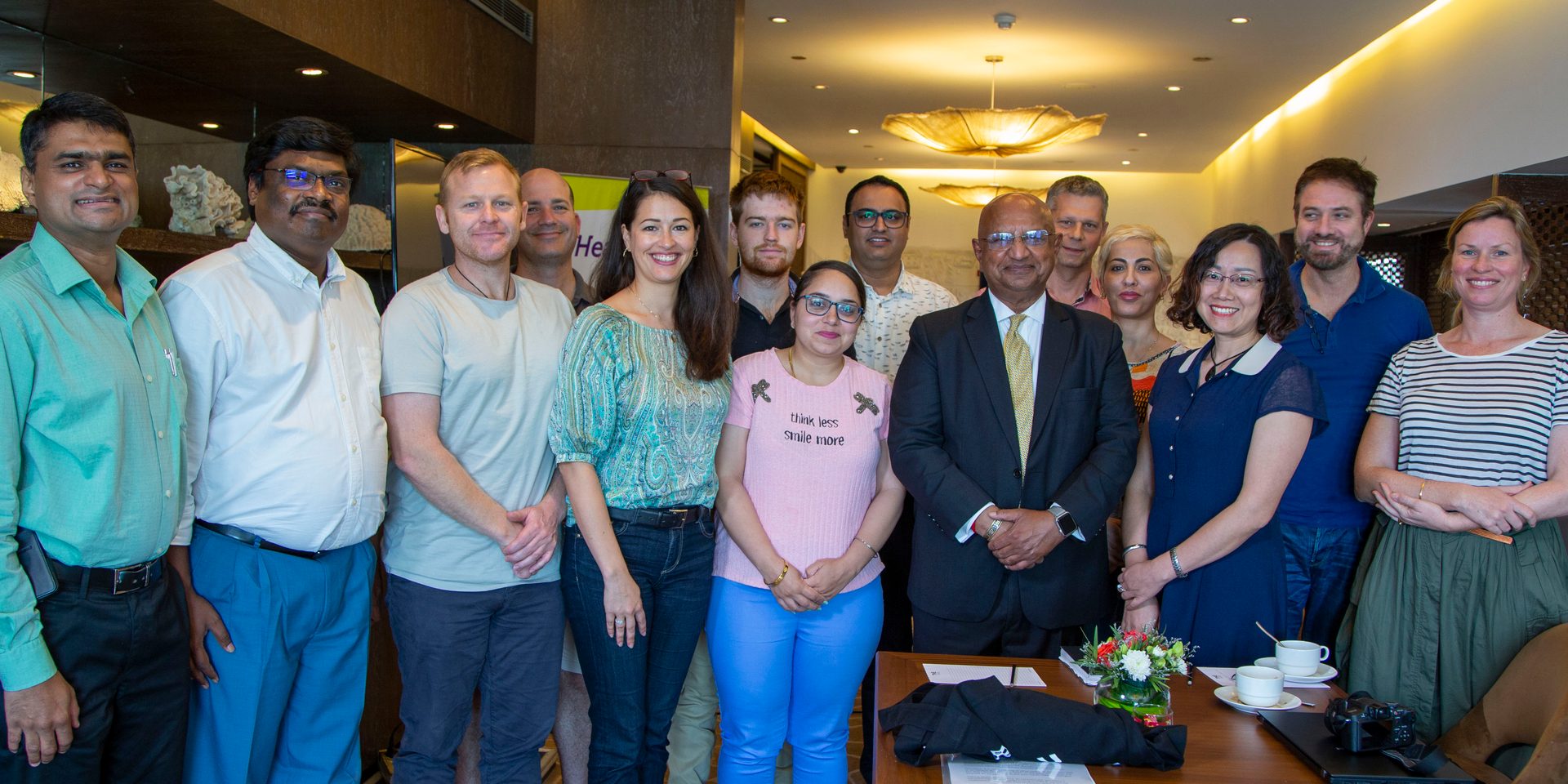
George Institute and UNSW Founders join hands to build an ecosystem for health innovations
In what could come as a big boost to entrepreneurs working to promote healthcare through innovations across the globe, UNSW Sydney and The George Institute for Global Health (TGI) have joined forces to launch a program designed to accelerate and scale up health focused start-ups. This programme is called Health10x.
This unique program was conceived by both The George Institute and UNSW and is being delivered by UNSW’s Entrepreneurship Unit. It leverages the deep technical expertise and health-related networks of TGI, as well as the program experience and global networks of UNSW.
The program’s first cohort of entrepreneurs includes five health start-up companies, all having a product or service that focuses on chronic diseases (such as heart disease, stroke, or diabetes) that will have an impact in the emerging economies. These start-ups are Bio-Sens Tech, Evidentli, BeacoHealth, Attoquest (previously Nano Bright) and Circulatory Support Technologies.
Through the course of 20 weeks, these start-ups will receive training in vital business development and entrepreneurship skills as well as health courses delivered by researchers at The George Institute. The accelerator programme includes an immersion trip to India from August 4 to 10 that will expose these start-ups to the healthcare sector in a key emerging market.
The Australian High Commission in India is supporting the Health 10x challenge and will be hosting the visiting teams on August 6, 2019.
Australia’s High Commissioner to India, Her Excellency Ms Harinder Sidhu said, “We are delighted to support the Health10x challenge. These Australian companies represent ground-breaking innovations in the health sector. This challenge forms a part of the Australian Government’s efforts to build connections and create opportunities for the Australian and Indian start-up sectors, and I see an enormous potential for cooperation.”
“Given India’s focus on creating an enabling ecosystem for innovation, it is timely that these start-ups are being provided this opportunity to explore the Indian market,” says Dr Oommen John from George Institute for Global Health India who is leading the Health10x programme in India.
During their six days in India, these innovators will validate how their offerings can actually transform health services delivery and improve outcomes in a real-life setting. They will visit local healthcare settings in Rohtak, Haryana, meet healthcare workers and get an understanding of the healthcare system in India. They will also meet with key officials at the National Health Agency and Ministry of Health and Family Welfare to gain an understanding of health delivery systems and the regulatory environment.
“Our aim is to help scale-up and deliver products that will help improve the health of millions of people worldwide,” said Dr Elizabeth Eastland, Director of Entrepreneurship at UNSW Sydney.
Five teams are travelling to India – working on projects from new treatments for heart failure, to low cost point of care testing for diabetes. “We are excited to be hosting these start-ups and hope that their visit to India is insightful and productive. India is an emerging hub for health innovations and the visit will definitely provide them with perspectives on how health challenges can be tackled in low and middle income countries,” says Professor Vivekanand Jha, Executive Director, George Institute for Global Health, India.
About the programme
The Australian start-ups were selected through a competitive process to participate in the accelerator and Indian market familiarisation program. The programme includes an immersion trip to India from Aug 4 to August 10 that will expose these start-ups to the healthcare sector in a key emerging market. These innovators will visit local healthcare settings in Rohtak, Haryana, meet healthcare workers, get an understanding of the healthcare system in India. They will also meeting with key officials at the National Health Agency and Ministry of Health and Family Welfare to gain an understanding of health delivery systems and the regulatory environment. Five teams are travelling to India – working on projects from new treatments for heart failure, to low cost point of care testing for Diabetes.
About UNSW Sydney
UNSW Sydney is a powerhouse of cutting-edge research, teaching and innovation.
We are one of the top 100 universities in the world, with more than 62,000 students and a 7,000-strong research community.
Located in Sydney, Australia, the University was established in 1949 with a specific focus on the scientific, technological and professional disciplines. UNSW is committed to making a difference through pioneering research and preparing the next generation of talented global citizens for career success.
UNSW is a founding member of the Group of Eight, a coalition of Australia’s leading research-intensive universities, and the prestigious Universitas 21 international network.
The main UNSW campus is located on a 38-hectare site at Kensington, seven kilometres from the centre of Sydney. Other major campuses are Art & Design in Paddington and UNSW Canberra at the Australian Defence Force Academy.
For more information, visit the website or twitter.
About UNSW Founders Program
The Founders Program is UNSW’s strategic initiative delivered by UNSW Entrepreneurship and is designed to embed entrepreneurship in every student, staff and alumnus’ experience. Established in 2017, it is Australia’s most comprehensive on-campus entrepreneurship initiative, supporting 200 startups and up to 7,500 participants per year through workshops, incubator and accelerator programs and coaching services.
About The George Institute for Global Health
The George Institute for Global Health is an independent medical research institute. It conducts research that targets preventable illnesses and injuries that are the leading causes of death and disability worldwide, including heart and kidney disease, stroke, diabetes, and injury. It is ranked in the leading ten research institutions in the world for research impact by the SCImago Institutions Rankings World Reports.
The George Institute was established in India in 2007 to generate high quality evidence and improve the health of millions of Indians by reducing premature deaths and disability from non-communicable diseases like cardiovascular disease, diabetes, kidney disease, stroke, mental health, and injuries. TGI India’s research uses innovative approaches to create system-wide change for people at the bottom of the pyramid, develop affordable and scalable solutions, and to empower people to improve their own health.
With researchers in Delhi, Hyderabad and around India, TGI India is a terrific example of Australia and India working together to improve people's health. Local innovation and medical research expertise paired with a global reach embodies The George Institute, India.
About the start-ups
Attoquest ( previously Nanobright) developed a patented novel compact, plug and play microscope that can accurately and specifically measure pathogens in minutes, in the field, using very small sample volumes, with much higher precision and sensitivity, and minimal training or experience compared to commercially available microscopes. This technology has the potential to increase our current sensitivity and specificity, which increase accuracy and speed of diagnosis
Bio-Sens Tech offers a solution for non-invasive, accurate and point-of-care detection of insulin in saliva using low cost paper test strip and mobile phone application. Along with early diabetes diagnosis, it empowers end-users to perform at-home insulin monitoring for better management of diabetes
BeacoHealth developed a solution that completely automates body turning in order to avoid hospital acquired pressure ulcers, occuring when healthcare workers fail to turn the patient's body every two hours. BeacoHealth helps to significantly reduce nurses' workload, time and effort needed for this and improve the quality of care.
Circulatory Support Technologies developed and patented a longer term, affordable, portable, reusable technology for bridge to heart transplantation
Evidentli - helps hospitals turn their real-world data into knowledge, so that doctors always have the latest evidence they need
Note: updated 26 November 2019




